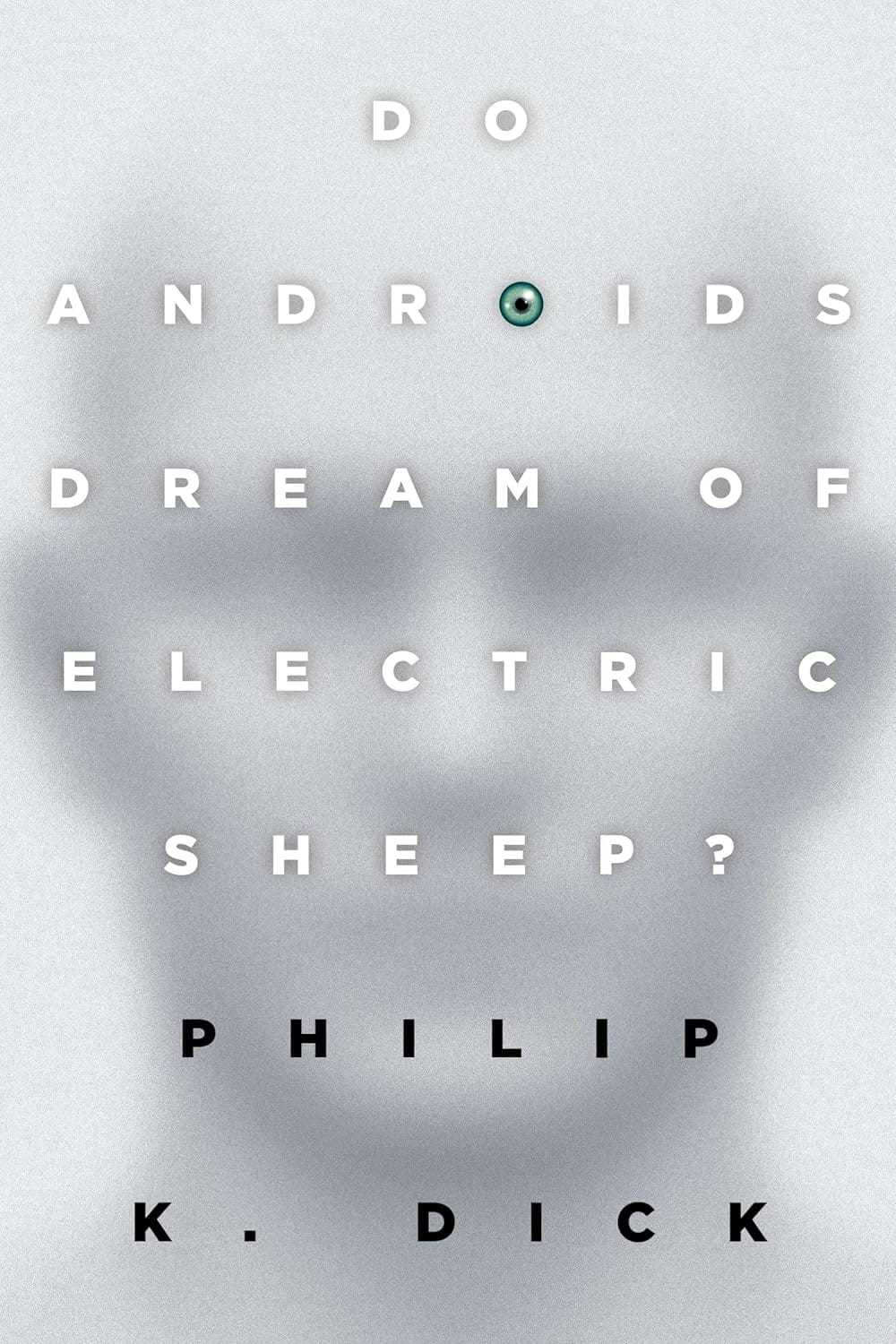Do Androids Dream of Electric Sheep?

I really enjoyed recapping some of my thoughts about 1984 last week, so I figured I'd keep the book review trend going. I've been on a dystopian kick lately, with my latest pick being Philip K. Dick's Do Androids Dream of Electric Sheep? It's a fun, fast-paced read following a particularly eventful day in the life of Rick Deckard, a bounty hunter who 'retires' androids in post-apocalyptic San Francisco. Lets dive in.
SPOILER ALERT: I'll try to stick to the broad themes of the novel, but there may be spoilers beyond this point.
The Setting
Androids was published in 1968 and, like many dystopian novels of the 20th century, was heavily influenced by humanities' collective, perpetual fear of nuclear annihilation. This particular novel was originally set in 1992 (changed to the year 2021 in later editions). In Philip's imagined dystopia, Earth underwent a nuclear war that completely irradiated the planet's atmosphere, resulting in a mass exodus of most of the surviving population to a new foothold of civilization on Mars. To incentivize people to make this exodus, citizens were promised free android companions; hyper-intelligent machines that resemble humans. These lifelike machines are designed to serve human beings, yet they are smarter, faster, and more efficient than their organic counterparts. Thus, they are deemed dangerous, and banned by the powers that be from residing on Earth.
Enter our protagonist, Rick Deckard. His job is to hunt down any rogue androids that have escaped from Mars and set up shop on Earth–usually by killing actual humans and stealing their identities. By the time we readers tune into Rick's life, android production has gotten so advanced–the latest being the infamous Nexus-6 model–it is increasingly difficult to distinguish between humans and androids. The resemblance is so precise with the new models that even androids themselves can be unaware of their mechanical nature.
The primary plot driver is the gargantuan task of hunting down six of the Nexus model androids in one day–something no bounty hunter has ever accomplished before. Tack on the fact that Rick is only given the task because the senior hunter in his department was near fatally wounded by one of them, and the stage is set. Rick has a dangerous job, something made very clear in the early pages of the book.
Empathy
Rick only has one method at his disposal for determining if a suspect is a human or an android: Empathy. Through a series of questions designed to elicit an instinctual empathetic response from a conscious human, and a few simple pieces of equipment, he can make a judgement call about a suspect. The stakes are high–If he guesses incorrectly he may end up the victim of a paranoid android, or a murderer. To further complicate things, he is required by law to administer the test, leaving him no choice but to put his intentions in plain view of a machine bent on self-preservation. With the Nexus-6 models that he must deal with, the line between organic and machine is blurrier than ever.
Empathy is the central theme of the entire novel. Tucked into the pages of action and sci-fi dystopia is an argument: Empathy is the one thing that makes us human. The ability to feel what other beings feel, to share in life's universal suffering and joy. It's something Rick intensely wrestles with throughout the story, especially when he begins to empathize with the very androids he's supposed to be hunting. See, what makes the Nexus-6 so interesting–and dangerous–is their ability to emulate empathy. But, as the story unfolds, we readers learn alongside the characters that this emulation exists only on the surface. Dig a little deeper and the cold, mechanical nature of the Nexus-6 androids is revealed in frightening fashion.
We also see this theme explored through the secondary protagonist of Androids, JR Isidore. Isidore is unkindly referred to as a Special, someone who failed the minimum IQ test requirement to be eligible for exodus to Mars. He is a lonely man living a lonely existence in an abandoned, decaying apartment complex in San Francisco. When he crosses paths with the same group of Nexus-6 androids that Rick Deckard is hunting, he welcomes them with open arms, ecstatic to have finally found companions–Something the androids take complete advantage of. It is through Isidore's frame of reference that we witness the most obvious examples of how starkly these mechanical, hyper-intelligent beings differ from real people.
Mercerism
Empathy actually forms the nucleus of the dystopian culture on Earth through Mercerism, a religious framework that pervades both Rick's life and Isidore's. Commonplace in every household is something called an empathy box. The empathy box has two handles which one can take hold of, which transports the user into a strange, alternate reality where they witness an old, frail man perpetually laboring uphill in a hot desert. Everyone who participates shares simultaneously in the collective joy and suffering of the mass of individuals engaging with their empathy boxes. Mercer, the old man climbing uphill, is a Christ-like figure, a grounding presence who endlessly endures suffering and takes on the unseen adversity of life.
Isidore is a devout disciple of Mercer. As is Rick's chronically depressed wife, Iran. To them, Mercer serves as a beacon of hope in a decaying world, a place to connect with humanity in an intimate way, sharing joy and pain alike. Even Rick, who isn't one for using an empathy box, is grounded in his lowest moments by Mercer and what he represents. Interestingly, androids seem to have a universal gripe with Mercerism, given it is the one thing they cannot genuinely experience.
Animals
Another pillar of the novel which supports the central theme is animals. Real animals are very rare in the story, with many species being outright extinct thanks to the radiation. They are both coveted and extremely expensive. Something Rick and Isidore both share is a mutual fascination and obsession with real creatures in a world dominated by the cheaper, electric models. Really, most of life for the average person on earth revolves around animals, outside of Mercerism. They serve as the primary topic for the questions Rick employs when screening for an android. In the beginning of the novel, Rick owns an electric sheep, a thing he resents. All he thinks about is what it would be like to own a real sheep.
A Prophetic Voice in a Rapidly Changing World
Do Androids Dream of Electric Sleep? is a compelling, heart-wrenching narrative about existence in a world where it is increasingly hard to distinguish between organic and machine, real and synthetic. The characters cling to the essence of their humanity in a miserable, decaying world. I think this book is incredibly apt for our society today as we live in the midst of the AI craze. While machine-learning is still rudimentary compared to what Philip K. Dick envisioned for his novel, the progress of our technological development is exponential; it isn't far- fetched that some day on the horizon we will have androids which walk among us, communicate like us, and look like us–even to the point where they themselves expression confusion as to what they are. The lines between reality and the virtual will continue to blur, to be sure, and I understand the fear of what such rapid progress in our quest for advancement might unleash.
That said, I can see a future where we integrate such technology into our lives in productive, healthy ways. After all, this book, and other dystopian novels like it, almost universally predicted that by 2025 we would have surely eradicated ourselves beyond repair with nuclear weaponry–yet here we stand.
Please, check it out for yourself. It's a fast, easy read with much more to say than what I covered here.

Do Androids Dream of Electric Sheep?
By 2021, the World War has killed millions, driving entire species into extinction and sending mankind off-planet. Those who remain covet any living creature, and for people who can’t afford one, companies built incredibly realistic simulacra: horses, birds, cats, sheep. They’ve even built humans. Immigrants to Mars receive androids so sophisticated they are indistinguishable from true men or women. Fearful of the havoc these artificial humans can wreak, the government bans them from Earth. Driven into hiding, unauthorized androids live among human beings, undetected. Rick Deckard, an officially sanctioned bounty hunter, is commissioned to find rogue androids and “retire” them. But when cornered, androids fight back—with lethal force.
Let me know what you think!
Till next time,
Ethan Mark






